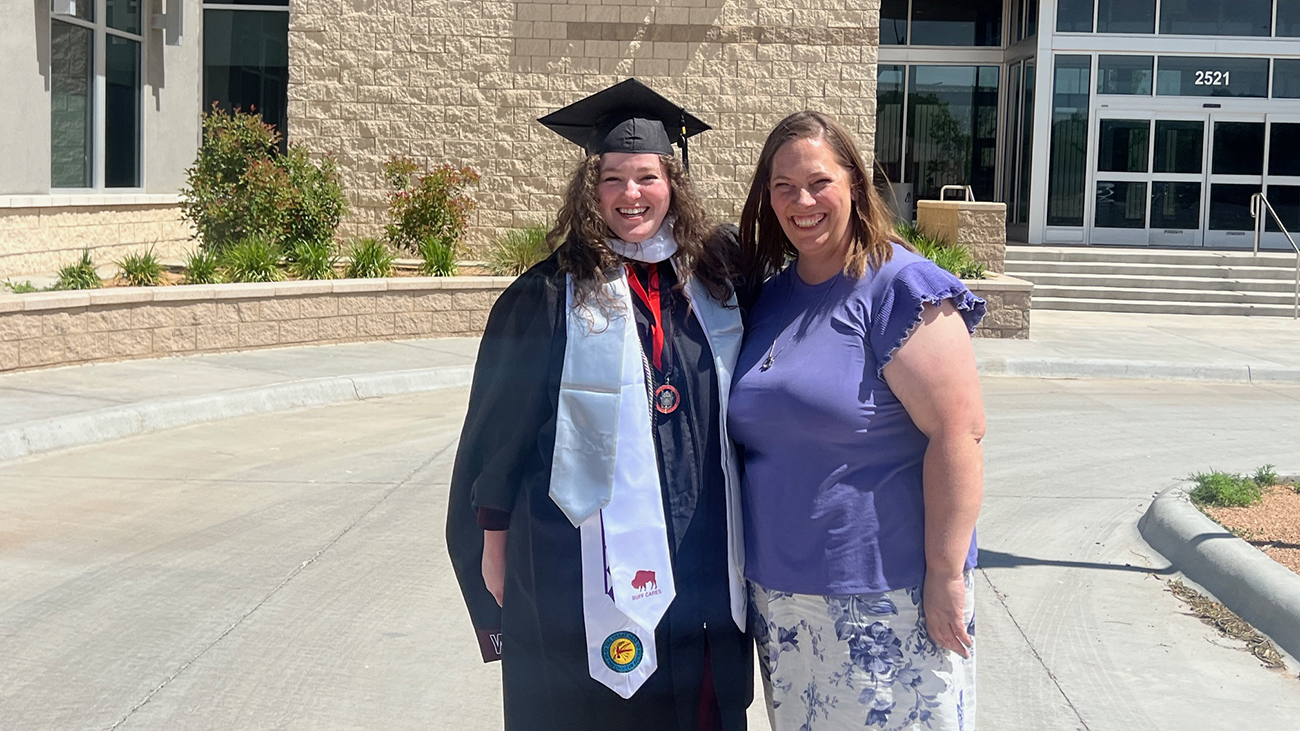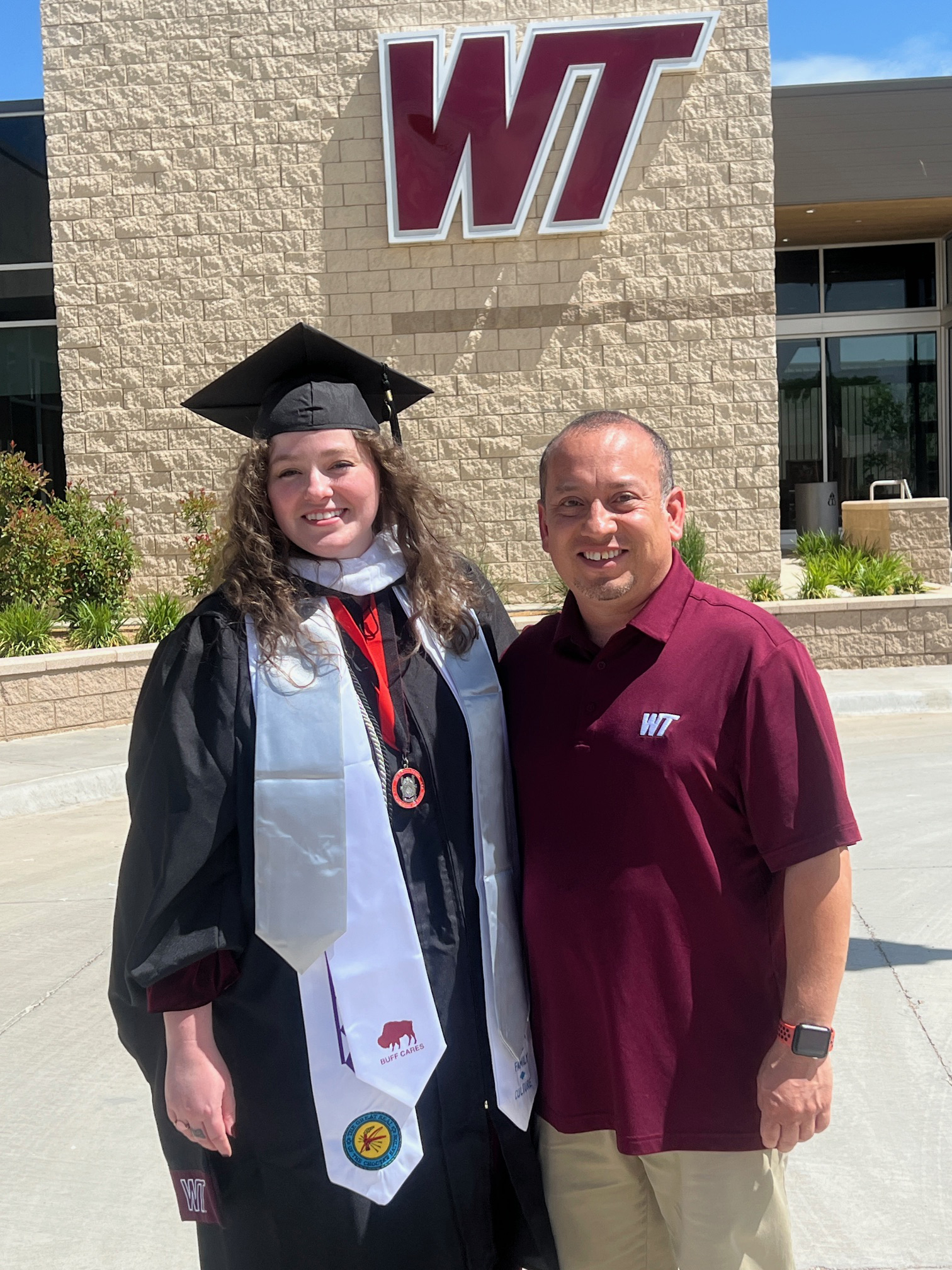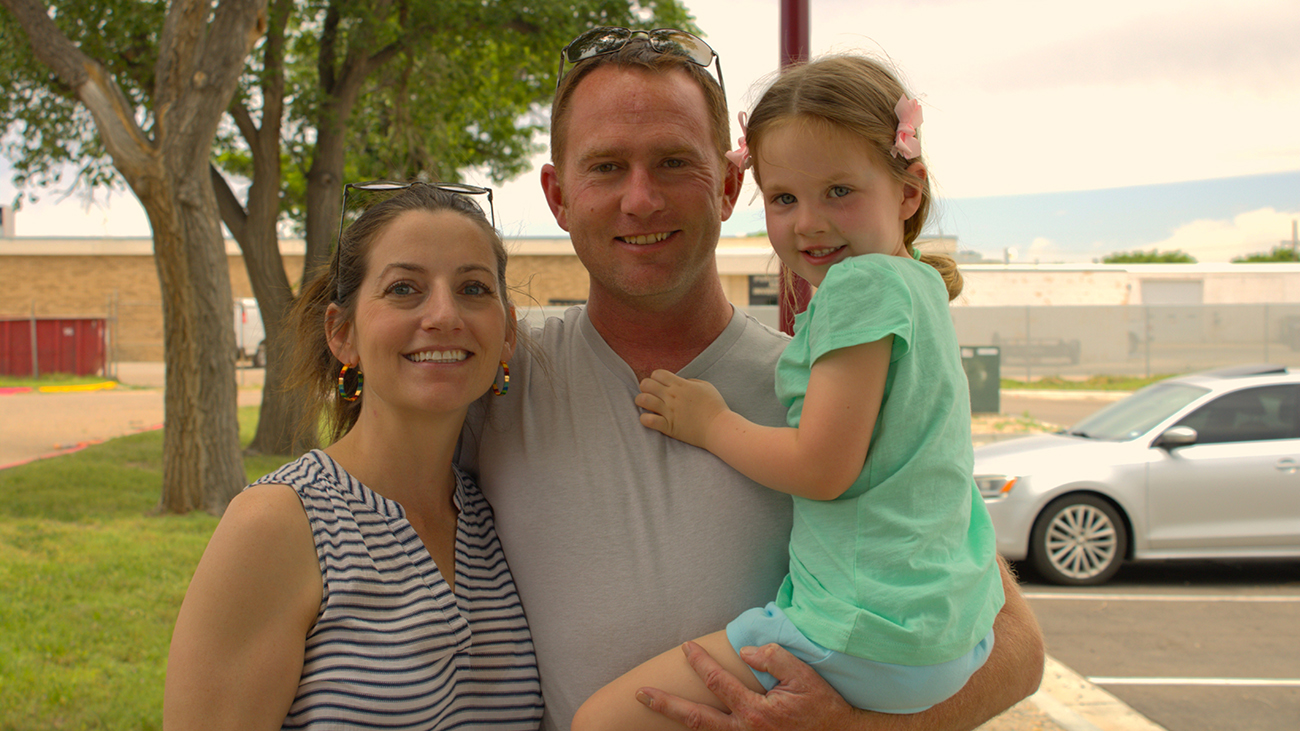- Science
- Graduate
- Community
- Featured
- Social Sciences
- Arts
- Jon Mark Beilue
Jon Mark Beilue: 'Helped get me on a different path'
First year of Buff CARES provided emotional support, financial help
By JON MARK BEILUE
Calvin Schaffer felt worthless, that he had ruined his life by losing the family farm and was about to lose his family. Brooke Montgomery twice attempted to take her life. Both could see the spiral began with alcohol. It was a little at first, and a lot for years. The rapid fall didn’t seem to end.
“Whatever got me drunk,” Montgomery said, “I’d drink it.”
Schaffer and Montgomery were two of West Texas A&M University’s seven students in Buff CARES, or College Addiction Recovery Education and Support. The program, originally inspired by longtime WT soccer coach Butch Lauffer and his wife Kim, has hit the one-year mark this month, and began implementation in the spring semester 2025.
“The way Buff CARES makes a difference is people feel truly cared about,” said Nita Likes, program director. “The biggest thing we offer, the thing that drives this, is we are giving these students a place to belong and a community to understand the experience and not judge them for it.”
Buff CARES is not a licensed rehab center, but a program of peer support by those with at least a year of recovery overseen by Dr. Holly Jeffreys, dean of the College of Nursing and Health Sciences at WT. Likes was a graduate assistant under Jeffreys beginning in December 2023. When WT began to explore the program, a group went to look at Texas Tech University’s highly effective program.
“I didn’t want to tell Dr. Jeffreys at the time, but I was like, ‘I would so want to run this program,’” Likes said. “I have such a heart for people in recovery. I’ve not been in recovery myself, but I’ve been in the foster care program and been around addiction.
“To be able to support people, to help them overcome their past and support the whole person, I felt like that was a way for me to make a difference.”

Photo: Buff CARES program director Nita Likes and the program's first graduate, Brooke Montgomery
To enroll in Buff CARES, a student must meet some academic requirements and be in at least nine months of sustained, abstinence-based recovery. Most, if not all, of the first class had more than that. They were older students. The youngest was 24, and the rest were near 40.
Montgomery, the first graduate within Buff CARES, was 34 when she received her master’s in counseling in May, 11 years after first earning her bachelor’s in English. She wore a white stole with “Buff CARES” spelled out with her cap and gown to honor their help.
“The program was beneficial to me in that I struggled a lot in making friends,” Montgomery said. “It’s hard for me to socialize. It was helpful to feel more connected and not feel the pressure to socialize. They took my needs into account. I felt supported, which meant a lot.”
Buff CARES centers on support, both financially and emotionally. Monetary aid is available with scholarships, but there are qualifications to receive that. It’s not a handout. But probably more important are other avenues of support – a place to go to help navigate the sometimes-confusing challenges of classes and other offerings, and other engagement like community service and recovery retreats.
Socially, students and counselors have gone bowling, tailgated at Buff football games, and allowed themselves to experience what they rarely have in their walk in recovery – fun.
“We try to teach them not just to live again in recovery, but to fully thrive,” Likes said. “We’ve had students tell us they didn’t believe having fun in recovery was possible, that out in the real world was overwhelming. We help them learn how to live again in a higher education environment, provide that safe space for them and a community of like people who support them.”
A lonely walk doesn’t have to be so lonely

Photo: Buff CARES advisory board member Cruz Luna and the program's first graduate, Brooke Montgomery.
“He’s a solid dude,” Schaffer said of Luna. “Similar story to me, a real alcoholic like me. There’s a commonality that we were all once on a sinking ship, so you always have that bond. I could tell he was real. People who weren’t alcoholics or addicts don’t know. They can’t read the room. He was the catalyst to get the ball rolling for me.”
Schaffer, 39, started drinking in high school at Groom. What was social drinking developed into heavy drinking and then into alcoholism. Between partying and working, two different stints at WT ended in academic disaster.
Heavy drinking initially got him into trouble both with the farm and family, and that was compounded because excessive drinking masked the pain he was facing. He was athletic and didn’t look like the typical alcoholic, but that just hid his struggle.
“I had messed up my life so bad,” Schaffer said.
He bottomed out in 2022, nearly dying and facing a divorce and potentially losing any contact with his then-2 ½-year-old daughter Chloe. It was a crossroads. A sponsor in AA in Pampa helped halt about a 15-year steep slide.
“I wanted to be there for Chloe,” he said. “That was the driving force. She thinks I hung the moon. She’s just a sweet soul. That was still not enough. It took AA and a spiritual experience. That obsession to drink was lifted from me. Truly God lifted that compulsion disease of mine to drink. He fixed it. I did a little work, but God did the rest.”The third time, Schaffer believed, was the charm. He returned to WT, about 25 hours shy of his bachelor’s in environmental science. He met Luna, was introduced to Buff CARES, and believed that might be the extra springboard and safety net he needed. That was especially true when Schaffer found himself in classes with many 15 to 20 years younger.
“Besides the obvious financial part, it changed my perspective on addiction and alcoholism,” said Schaffer, who had a 3.3 GPA in his first semester back and wants to eventually get a master’s in environmental science with an emphasis in toxicology.
“In a recovering community like Buff CARES, there are worse stories than mine. There’s a common feeling of community and it helps not to feel alone and ostracized. Buff CARES allowed me not to feel useless. It raised my self-esteem and got me on a different path.”
Montgomery drank for the first time on her 21st birthday. With alcoholism in the family, it didn’t take long to spiral down. Liquor of almost any kind, combined with pot, opioids or a variety of pills, became frequent. It was a long and lethal list, but somehow Montgomery graduated from WT with her bachelor’s.
“There were 10 years of hell,” she said. “A lot of pain.”
There were two suicide attempts, one in 2018 and a much more serious one in 2020. Montgomery said she felt like she was going through the motions of rehab. But the second suicide attempt convinced her she didn’t want her life to end like this. A third rehab in Timberline Knolls mental health treatment center in Illinois helped jumpstart positive change.

Photo: Buff CARES student Calvin Schaffer, girlfriend Laren Jerige and daughter Chloe Schaffer
With several suggesting she would be an effective counselor, Montgomery enrolled at WT in July 2022 to pursue her master’s. She was approached to consider Buff CARES. Somewhat unsure of the first-year program, Montgomery ultimately decided to join. She found that emotional support boost that would have been hard to receive with all classes online.
Eleven years after her bachelor’s degree, 11 years after climbing from the depths of depression to a master’s degree, Montgomery found herself walking the stage in May at WT’s First United Bank Center.
The first year of any program, be it sports, academic, special interest, or in this case, recovery, is often one of trial and change because it’s all new. Getting the word to the public of Buff CARES is a challenge too. But it can help support the change in lives, like it did for Shaffer, Montgomery and others.
“Life can be very unpredictable,” she said. “At times, it can be a lonely road to walk. But it’s entirely possible to get to a spot where you do enjoy life. I still have my own struggles; however, it’s a lot better than what it was.
“It’s possible to get out of the pit where it feels like it doesn’t matter and it’s hopeless and get to a point where you’re not simply existing but really living.”
Top photo: Brooke Montgomery, right, is congratulated by West Texas A&M University President Walter V. Wendler at a May 17 commencement ceremony in the First United Bank Center. Montgomery is the first graduate through WT's Buff CARES, a program of peer support by those in the final year of rehab.
Do you know of a student, faculty member, project, an alumnus or any other story idea for “WT: The Heart and Soul of the Texas Panhandle?” If so, email Jon Mark Beilue at jsbeilue@yahoo.com.

